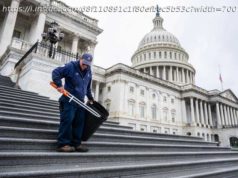A Utah lawmaker introduced a bill that would rename the state’s most scenic route in honor of the president. An opponent has suggested an unusual amendment.
Families visiting America’s iconic national parks this summer might be surprised to find a new attraction amid the canyons, cliffs and juniper trees: the Donald J. Trump Utah National Parks Highway.
A Utah lawmaker has introduced a bill that would rename the state’s most scenic route in honor of the president, placing 62 Donald Trump signs along a 600-mile stretch that rolls through or near five national parks: Arches, Canyonlands, Capitol Reef, Bryce Canyon and Zion.
The bill’s sponsor, State Representative Michael E. Noel, a Republican, is calling the move a show of gratitude to Mr. Trump for the president’s December decision to slash the size of two contentious national monuments in the state, Bears Ears and Grand Staircase-Escalante.
An opponent of the bill, State Senator Jim Dabakis, has said he would fight it by adding the name of an adult film star who is reported to have had an affair with the president. “If it gets to the Senate,” Mr. Dabakis threatened on Twitter this week, “I will present an amendment that the frontage road be designated as the Stormy Daniels rampway.”
But Mr. Dabakis, a Democrat, could be on the losing side in a state where the Legislature is dominated by Republicans who have supported Mr. Trump for scaling back the monuments. “I think it’s going to happen,” he conceded in a telephone interview from the Senate floor. “If a vote is forced, there is not a lot of Utah politicians that are going to stand up and say they are against anything Trump.”
First, though, the bill needs to pass the House and to be introduced in the Senate. In a meeting with reporters on Tuesday, Gov. Gary Herbert, a Republican, declined to take a stance on the highway — or the Stormy Daniels on-ramp idea — but said it might be “a little premature” to name the route for a man who has barely entered his second year in office.
“I recognize the zeal and enthusiasm that some have for Donald J. Trump, and I share the enthusiasm,” Mr. Herbert said. “But there is probably a reason why we wait five years for people to vote to be put in the Hall of Fame.”
While many presidents have had highways named in their honor — there is the President George Bush Turnpike in the Dallas area, the John F. Kennedy Expressway in the Chicago area and about a dozen highways named for Ronald Reagan — such a proposal is unusual this early in a president’s tenure.
The proposal is the latest volley in a public lands fight that has shaped political and economic conversations in the West for a generation. In 1996, President Bill Clinton stunned Utahns, including the governor at the time, Mike Leavitt, by turning about two million acres of public land into Grand Staircase-Escalante National Monument.
The move blocked a coal mine expected to bring many jobs to the area, as well as future oil and gas development, and it left many Utahns smarting. In 2016, when President Barack Obama created another monument, Bears Ears, anger in some corners only intensified.
Mr. Trump drastically reduced both of those monuments, opening the region to possible mining and drilling.
The highway proposal is supported by residents like Leland Pollock, a commissioner in Garfield County, an area that contains parts or all of three national parks and two national monuments. “He listened to us,” Mr. Pollock said of the president. “He came out and he honored our request.”
Mr. Trump, of course, already has his name on plenty of property, and the highway move could prompt a backlash from visitors and corporations, much in the way a North Carolina bathroom bill inspired protests and boycotts. Already, a pair of influential outdoor trade shows have left the state to object to lawmakers’ push to shrink the monuments, yanking some $45 million in annual revenue.
Mr. Pollock said he did not think the move would spur financial repercussions.
But State Representative Brian S. King, the House minority leader, disagreed. In addition to the estimated $124,000 it would cost to install Trump highway boards, Mr. King pointed out that Utah would have to deal with “the significant continuing expense of replacing or fixing stolen, damaged and vandalized signs.”






